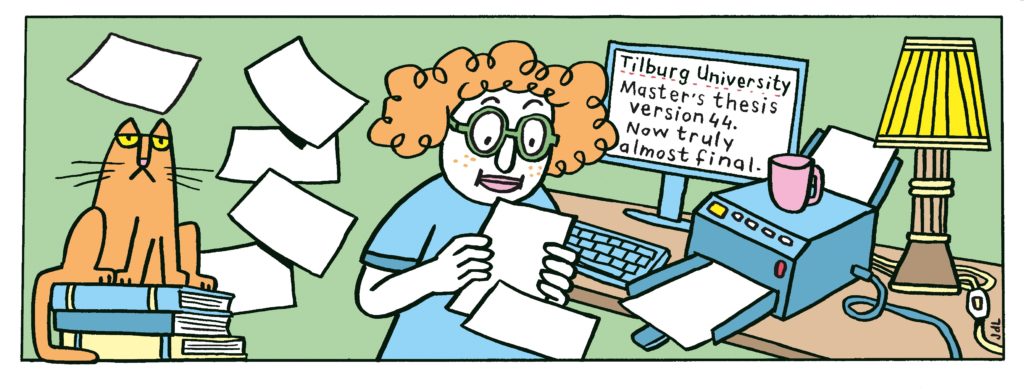Mandatory sustainability: are climate regulations forcing companies into action?
How does the fight against climate change affect existing contracts of large companies? In her master’s thesis, former law student Floor Coopmans investigates the legal implications of mandatory sustainability measures and their impact on commercial agreements.

What is your thesis about?
‘I wrote my thesis about the potential consequences of a company’s obligation to reduce its CO2 emissions and what that means for existing contracts with other parties. My interest in this topic was sparked by two major climate cases in the Netherlands in recent years.
‘First, there was the ruling in the case of environmental organization Urgenda against the Dutch state, where the government was mandated to reduce its emissions. Shortly after, in 2021, Shell was ordered to cut its CO2 emissions by 45% by 2030 compared to 2019. This was a groundbreaking case; never before had a company been subjected to such a concrete CO2 reduction requirement.
‘This got me thinking. If a company like Shell is forced to make drastic changes, possibly halting certain business activities or fully transitioning to sustainable practices, what happens to the existing contracts? Can Shell still fulfill those agreements? And if not, would the company have to pay damages to the other party because they can no longer meet their obligations?
‘This raises the broader question: how should such a situation be legally classified under Dutch law? The rules seem clear: party A must compensate party B for breach of contract, but is it really that black and white when it comes to something as complex and global as climate change?’
What did your research reveal?
‘My research shows that when a company is confronted with a CO2 reduction obligation, it cannot simply claim: ‘I didn’t see this coming, it’s not my fault, it’s a case of force majeure or unforeseen circumstances.
‘In the case of Shell, this is very concrete. The court ruling made it clear that Shell has been aware of climate change, its dangers, and their own role in it for decades. Therefore, it’s harder for Shell to argue that they were unaware of the risks. This specific case is a key example in my thesis.

‘I also focused on developments at the European level, such as the Corporate Sustainability Reporting Directive (CSRD) and the Corporate Sustainability Due Diligence Directive (CSDDD). These are laws that require large companies to report on sustainability and create climate transition plans aligned with the goal of limiting global warming to 1.5 degrees Celsius.
‘Interestingly, the CSRD and CSDDD don’t just affect the company itself, but also its supply chain and partners. This means that the entire supply chain of a company is under pressure to comply with European sustainability requirements.
‘The responsibility mainly lies with the large companies subject to this legislation, but they often need information from their supply chain partners to report on the CO2 emissions in the supply chain. This requires new contractual terms about how this responsibility and the associated risks are distributed.’
What are those risks exactly?
‘The risks include the reliability of the information provided. Who is responsible if the information is incorrect? Is it the smaller company that may not have the resources to verify everything, or should the large company bear that responsibility? The legislation suggests the latter, but in practice, it remains to be seen how this will be implemented.’
Did you encounter any other interesting points during your research?
‘One interesting parallel I drew in my research is with the coronavirus crisis. Many parties could not fulfill their contracts, such as hospitality businesses that had little income due to lockdowns and couldn’t pay rent.
‘In such cases, it was often argued from a solidarity perspective that parties should renegotiate to find a reasonable solution. There was even talk of a ‘share the pain’ obligation, where the parties shared the costs and losses.
‘Climate change is, of course, different from the coronavirus crisis because, with climate change, everyone can be held responsible to some extent. However, I think the solidarity principle is relevant here as well. You could argue for a fifty-fifty division of the damage caused by CO2 reduction obligations, as the other party often emits CO2 as well.
‘But there may be reasons to deviate from this distribution, for instance, if a company has long been aware of its high CO2 emissions and has done little to reduce them.’
Master’s thesis
A literature review, experiments in the lab, or working with SPSS? Students at Tilburg University write a wide range of theses. Each month, Univers features one in the Master’s Thesis section.
Author: Floor Coopmans
Title: Climate Liability and the Impact on Commercial Contracts: The Consequences of a CO2 Reduction Obligation for Companies Subject to Reduction and Their Contractual Counterparties
Supervisor: Madeleine van Rossum
Grade: 8,0
Master’s program:Commercial Legal Practice: Contracts and Liability Law







